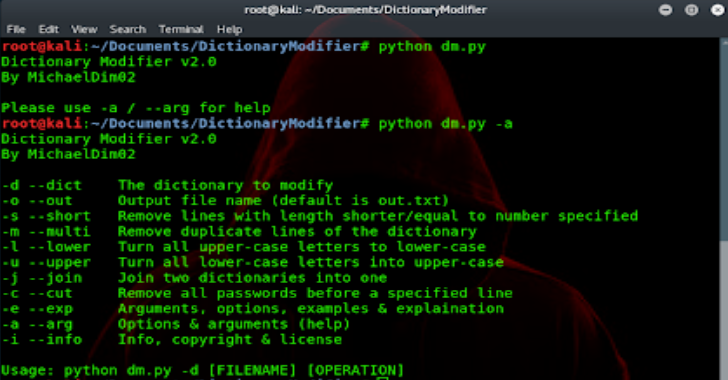IntelSpy is a tool used to perform automated network reconnaissance scans to gather network intelligence.
It is a multi-threaded network intelligence tool which performs automated network services enumeration. It performs live hosts detection scans, port scans, services enumeration scans, web content scans, brute-forcing, detailed off-line exploits searches and more.
The tool will also launch further enumeration scans for each detected service using a number of different tools.
Features
- Scans multiple targets in the form of IP addresses, IP ranges (CIDR notation) and resolvable hostnames.
- Scans targets concurrently.
- Detects live hosts in an IP range (CIDR) network.
- Customizable port scanning profiles and service enumeration commands.
- Creates a directory structure for results gathering and reporting.
- Logs every command that was executed.
- Generates shell scripts containing commands to be run manually.
- Extracts important information in txt and markdown format for further inspection.
- Stores data to an SQLite database.
- Generates an HTML report.
Requirements
- Python 3 (
sudo apt install python3) - Linux (preferably Kali Linux or any other hacking distribution containing the tools below.)
- toml (https://github.com/toml-lang/toml)
- seclists (https://github.com/danielmiessler/SecLists)
- curl (prerequisite) (
sudo apt install curl) - enum4linux (prerequisite) (
sudo apt install enum4linux) - gobuster (prerequisite) (
sudo apt install gobuster) - hydra (optional) (
sudo apt install hydra) - ldapsearch (optional) (
sudo apt install ldap-utils) - medusa (optional) (
sudo apt install medusa) - nbtscan (prerequisite) (
sudo apt install nbtscan) - nikto (prerequisite) (
sudo apt install nikto) - nmap (prerequisite) (
sudo apt install nmap) - onesixtyone (prerequisite) (
sudo apt install onesixtyone) - oscanner (optional) (
sudo apt install oscanner) - pandoc (prerequisite) (
sudo apt install pandoc) - patator (optional) (
sudo apt install patator) - showmount (prerequisite) (‘system tool ‘)
- smbclient (prerequisite) (
sudo apt install smbclient) - smbmap (prerequisite) (
sudo apt install smbmap) - smtp-user-enum (prerequisite) (
sudo apt install smtp-user-enum) - snmpwalk (prerequisite) (
sudo apt install snmp) - sslscan (prerequisite) (
sudo apt install sslscan) - svwar (prerequisite) (
sudo apt install sipvicious) - tnscmd10g (prerequisite) (
sudo apt install tnscmd10g) - whatweb (prerequisite) (
sudo apt install whatweb) - wkhtmltoimage (prerequisite) (https://github.com/wkhtmltopdf/wkhtmltopdf/)
- wpscan (optional) (
sudo apt install wpscan)
pip3 install -r requirements.txt
Usage
$ python3 intelspy.py -h
___ __
| ._ _|_ _ | (_ ._
_|_ | | |_ (/_ | __) |_) \/
| /
IntelSpy v2.0 - Perform automated network reconnaissance scans to gather network intelligence.
IntelSpy is an open source tool licensed under GPLv3.
Written by: @maldevel | Logisek ICT
Web: https://logisek.com | https://pentest-labs.com
Project: https://github.com/maldevel/intelspy
usage: intelspy.py [-h] [-ts TARGET_FILE] -p PROJECT_NAME -w WORKING_DIR
[--exclude <host1[,host2][,host3],...>] [-s SPEED]
[-ct <number>] [-cs <number>] [--profile PROFILE_NAME]
[--livehost-profile LIVEHOST_PROFILE_NAME]
[--heartbeat HEARTBEAT] [-v]
[targets [targets ...]]
positional arguments:
targets IP addresses (e.g. 10.0.0.1), CIDR notation (e.g.
10.0.0.1/24), or resolvable hostnames (e.g.
example.com) to scan.
optional arguments:
-h, --help show this help message and exit
-ts TARGET_FILE, --targets TARGET_FILE
Read targets from file.
-p PROJECT_NAME, --project-name PROJECT_NAME
project name
-w WORKING_DIR, --working-dir WORKING_DIR
working directory
--exclude <host1[,host2][,host3],...>
exclude hosts/networks
-s SPEED, --speed SPEED
0-5, set timing template (higher is faster) (default:
4)
-ct <number>, --concurrent-targets <number>
The maximum number of target hosts to scan
concurrently. Default: 5
-cs <number>, --concurrent-scans <number>
The maximum number of scans to perform per target
host. Default: 10
--profile PROFILE_NAME
The port scanning profile to use (defined in port-
scan-profiles.toml). Default: default
--livehost-profile LIVEHOST_PROFILE_NAME
The live host scanning profile to use (defined in
live-host-scan-profiles.toml). Default: default
--heartbeat HEARTBEAT
Specifies the heartbeat interval (in seconds) for task
status messages. Default: 60
-v, --verbose Enable verbose output. Repeat for more verbosity (-v,
-vv, -vvv).Usage Examples
- Scanning single target
sudo python3 intelspy.py -p MyProjectName -w /home/user/pt/projects/ 192.168.10.15
sudo python3 intelspy.py -p MyProjectName -w /home/user/pt/projects/ 192.168.10.15 -v
sudo python3 intelspy.py -p MyProjectName -w /home/user/pt/projects/ 192.168.10.15 -vv
sudo python3 intelspy.py -p MyProjectName -w /home/user/pt/projects/ 192.168.10.15 -vvv
- Scanning a hostname
sudo python3 intelspy.py -p MyProjectName -w /home/user/pt/projects/ example.com
- Scanning a network range(CIDR)
sudo python3 intelspy.py -p MyProjectName -w /home/user/pt/projects/ 192.168.10.0/24
- Scanning multiple targets (comma separated)
sudo python3 intelspy.py -p MyProjectName -w /home/user/pt/projects/ 192.168.10.15 192.168.10.0/24 example.com
- Scanning targets from file
sudo python3 intelspy.py -p MyProjectName -w /home/user/pt/projects/ -ts /home/user/targets.txt
- Excluding one host
sudo python3 intelspy.py -p MyProjectName -w /home/user/pt/projects/ –exclude 192.168.10.9 192.168.10.0/24
- Excluding many hosts
sudo python3 intelspy.py -p MyProjectName -w /home/user/pt/projects/ –exclude 192.168.10.9,192.168.10.24 1

















